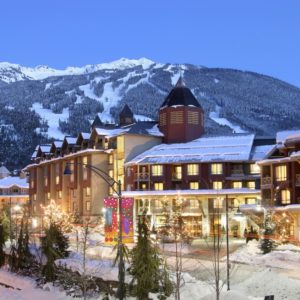Playing the game of green politics sometimes comes with real costs. That’s what mountain resort towns are starting to learn, as efforts to preserve wilderness and fight climate change are beginning to bite into tourism revenues. Both in Colorado, and in Canada, communities are discovering that hard line stances against energy production–and even development more broadly–are forcing local governments to make tough decisions and leaving locals unhappy.
In British Columbia, the ski town of Whistler is learning that threats of lawsuits can have unintended consequences. In mid-November, Whistler Mayor Jack Crompton sent a letter to 20 international energy companies, including two operating in Canada, asking for money to compensate for climate change’s effects on his community.
“We are writing to ask your company to commit to pay a fair share of the costs of climate change being experienced by Whistler. Communities around the world are increasingly expecting you to take responsibility for your products,” says Crompton’s letter. “We look forward to discussing how you will do so.”
The letter argues that Whistler residents will bear a financial burden because of the effects of climate change, including increased wildfire prevention costs and the potential for less snow. Reduced snowfall would be a serious concern for the area, given the importance of tourism to the area economy.
At first, the letter was greeted with eye rolls and chuckles from members of the energy industry, who pointed out that three million people visit Whistler each year and most of them take a plane or car to get there. The reaction was an embarrassment for Crompton, who was forced to walk back the tone of his original letter.
“Our goal was not to ignore our own role in climate change but to encourage change and action on climate change,” he said in a statement to the National Post.
The trouble is, that hasn’t been enough. The Canadian Imperial Bank of Commerce (CIBC), one of the five largest banks in Canada, has a three-day investment conference scheduled at the resort in January, with a panel devoted to energy production. In fact, an online agenda for the event showed that 43 of the 114 companies scheduled to present were either oil and gas producers or provided oilfield services. Several energy firms had already said that they would back out of the event because of the letter.
Last week, 1,500 people and a convoy of more than 600 vehicles gathered in Alberta to protest the letter and show support for the industry.
Crompton released a video apology last week in which he tried to reassure potential visitors that his “aim was never to make anyone feel unwelcome in Whistler.”
The industry seems to have gotten a different message. After 22 years of hosting their conference in Whistler, CIBC has announced that they are looking to relocate the event going forward.
“Instead of threatening the energy industry and the livelihood of their neighbors in Alberta, these cities in British Columbia should be focused on working with the business community to find common sense solutions,” John Glennon, a researcher with Energy In Depth, told InsideSources.
“Lawsuits will do nothing to reduce emissions, and these tone-deaf tactics have only served to enflame tensions between these communities.”
Outdoor enthusiasts should also be careful since some of the argument used against the oil and natural gas industries are now being turned against recreational development. Outside of Aspen, Colorado, a proposed mountain bike trail is exposing tensions between area residents and the tourism industry.
For more than two years, residents of Pitkin County have argued about the impacts of a 83 mile bike trail. Residents of the Crystal River Valley worry that the trail would pass through sensitive wildlife areas in the Crystal River Valley. Instead of spending money on a trail, they say the county should use its open space funds to support wildlife protection projects and to work on water quality issues, especially given the potential future impacts of climate change.
Meanwhile, mountain biking enthusiasts are touting the economic benefits that the completed trail would bring to the area.
“Trails are our future and the proof is out there,” said Dave Ochs, the head of the Crested Butte Mountain Bike Association in an interview with the Colorado Sun. “Recreation is our livelihood, our values and our culture. Connectivity of trails is our future, with getting more people off the road and into our public lands. We need to provide better trails experiences.”
Trail supporters cite a study showing that mountain bikers in the National Forest spend about $24 million each year and support 315 jobs. Hikers support about the same number of jobs, but make about four times as many visits. For the community of Crested Butte, which relies heavily on tourism, this makes support for the trail an easy choice–albeit not one shared by all its neighbors in the valley.
“Debate over the bike trail parallels debate over oil and gas development. Except this time it’s the outdoor industry that’s forced to defend significant impacts on the environment and wildlife,” Aaron Johnson, vice president of public affairs for the Western Energy Alliance tells InsideSources.
He sees in the Colorado debate a sign that communities are starting to want to shut down all development, not just energy projects.
“After trying to close off public lands to anything but recreation and conservation, the outdoorists are confronted by skeptical communities who’ve been allies against oil and gas development,” he added, explaining that development and conservation can exist simultaneously.
The trail project was narrowly approved in a vote on Thursday night. However, as in Whistler, the rancor of the debate shows that environmentalism does not always play well with tourism, even in areas where outdoor sports are big business. Having pushed for pro-environmental policies, some of these resort areas are finding that allying with the green movement will cost them green as well.

